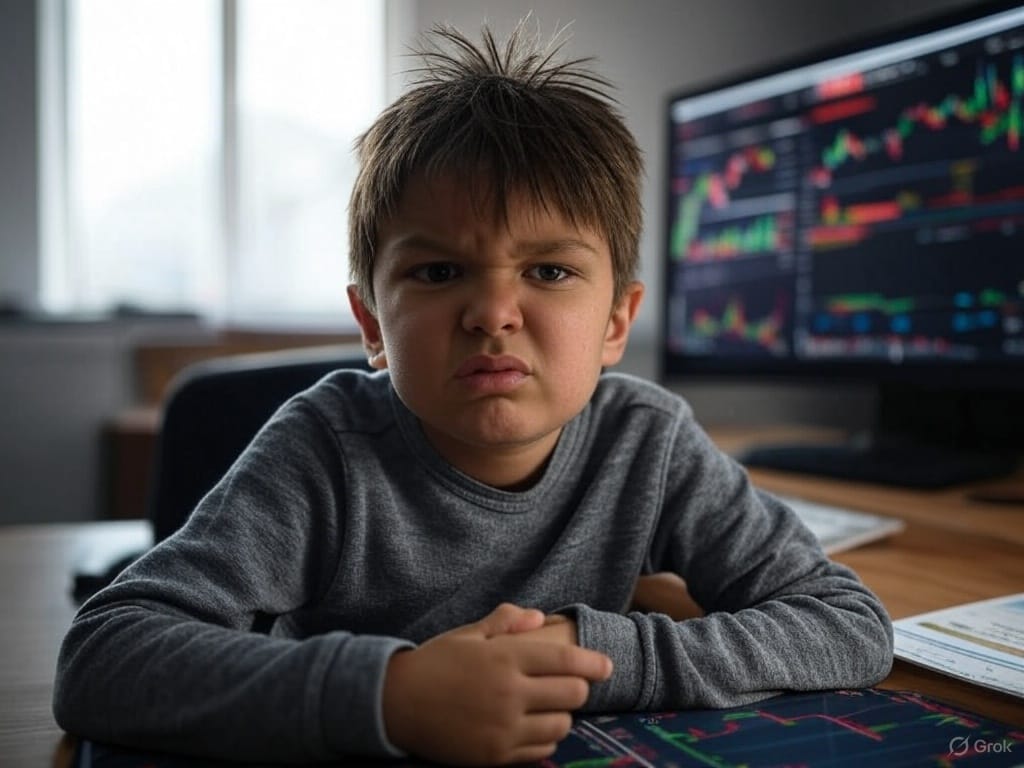- BiteOfCrypto | Traders Psychology
- Posts
- Reacting to a Loss Feels Like a Child Losing Their Favourite Toy
Reacting to a Loss Feels Like a Child Losing Their Favourite Toy
Why set backs trigger our most childlike reactions and how to handle them better.
Losing a trade doesn’t just sting financially. It cuts deeper, shaking your confidence and control in a way that’s hard to explain unless you’ve felt it.
One moment you’re composed and calculated. The next, you're staring at red numbers, questioning everything you thought you knew.
This is where many traders get trapped. Not by the market, but by their own psychology.
I’ve spoken before about the trader who wins early, without a plan. A few good trades, a few lucky entries, and suddenly they believe they're ahead of the game.
But early success built on randomness is a dangerous illusion. Without a structure, ego takes over.
Each win inflates a sense of mastery. And the more inflated that ego becomes, the further away they drift from discipline.
Until the loss comes. And when it does, it hits harder than it should.
The mindset shifts. That confident trader becomes reactive, bitter, and defensive.
They blame the market. They claim it’s unfair.
But the truth is simple. The market doesn’t owe you anything.
It’s not there to reward effort or intention. It responds only to structure, discipline, and probability.
So when the loss arrives, they feel robbed. Not just of money, but of identity, progress, and momentum.
And here’s where it becomes deeply human. Because that emotion, that sense of something being taken from you, is one we’ve all felt before.
The Psychology Behind the Reaction
Think back to childhood. You’re playing, enjoying yourself, immersed in something meaningful to you and suddenly, it’s taken away.

Not because of anything you did wrong. Simply because someone else had the power to end it.
You weren’t prepared. You didn’t get to process it. It was over before you understood why.
That pattern leaves a mark. It creates an emotional blueprint we carry into adulthood.
We learn, unconsciously, that good moments can be taken without warning. And that we have little control over when or why.
This is the emotional reflex many traders bring to the screen. Joy to pain in an instant. Familiar, unexamined, and deeply personal.
We don’t often realize it’s happening. We just react.
Why It Shows Up in Trading
The market triggers old emotional pathways that were wired long before we ever opened a chart. When a trade turns against us, it feels less like a calculation gone wrong and more like something unfair being done to us.

That reaction is rooted in the past. But the consequences are happening now.
Instead of analyzing objectively, we look for someone or something to blame. We shift from strategy to survival.
And when that shift happens, we stop trading. We start acting.
We start forcing trades. Chasing losses. Ignoring rules we never built in the first place.
Because if we don’t understand the emotional weight of loss, we will always misinterpret its meaning. We’ll think something has been taken from us when in reality, we just encountered the part of trading that tests our preparation.
The Real Lesson
The market is not personal. But your reaction to it is.
It doesn’t take your joy or your confidence. It reveals how stable those things were to begin with.
If you haven't built a foundation, the first storm will expose you. And when that happens, it won’t feel like feedback, it will feel like betrayal.
But it’s not betrayal. It’s the truth showing up without apology.
You don’t overcome this by trying harder. You overcome it by understanding the emotional patterns you're repeating.
If you want to grow as a trader, you need to recognize where those patterns began. And more importantly, where they no longer serve you.
The market doesn’t care about your past. But if you don’t deal with it, it will keep controlling your future.
How to Break the Pattern
The first step to breaking this emotional pattern is taking full responsibility for your actions. Not partial. Full. That means no blaming the market, news, volatility, or manipulation. You are responsible for the risk you take, and for how you respond when trades go wrong.
Start by trading with intention, not impulse. Build a plan before you enter the trade, not after you’re in it. Know your edge, define your risk, and stick to your process regardless of how you feel. Emotional trading is reactive. Professional trading is prepared.
You also need to train patience like a skill. If you miss a trade, let it go. The market will always offer another opportunity. Rushing back in only increases your chance of making mistakes.
Approach each session with caution and respect. Trading isn't about being active—it’s about being selective. Only the best setups deserve your capital.
The goal is not just to win more trades. It’s to become the kind of trader who can weather losses without being emotionally hijacked.
Because when you stop reacting like something was taken from you, and start responding like you’re in charge, you’ve already leveled up. That’s when trading transforms from chaos to control.
Meme of the day!

Always have your trading plan to be a cool cat
Thanks for reading,
Ahmed.